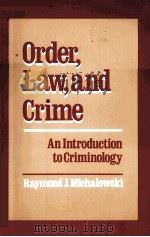《Transnational Organised Crime in International Law》
| 作者 | Tom Obokata 编者 |
|---|---|
| 出版 | Hart Publishing |
| 参考页数 | 246 |
| 出版时间 | 没有确切时间的资料 目录预览 |
| ISBN号 | 1841136905 — 求助条款 |
| PDF编号 | 812918368(仅供预览,未存储实际文件) |
| 求助格式 | 扫描PDF(若分多册发行,每次仅能受理1册) |
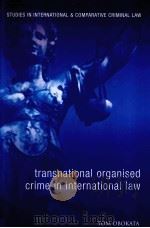
1 Introduction1
1.1 The Rise of Organised Crime1
1.2 Contemporary Manifestation of Organised Crime4
1.3 The Scope and Aim of This Book7
Part Ⅰ: Concepts, Norms and Principles11
2 Understanding Organised Crime from a Multi-Disciplinary Perspective13
2.1 Introduction13
2.2 Concepts of Organised Crime from a Multi-disciplinary Perspective14
2.2.1 Organised Crime as a Set of Actors14
2.2.2 Organised Crime as a Set of Activities19
2.3 Legal Definitions of Organised Crime in National and International Law24
2.3.1 Definitions of Organised Crime in International Law24
2.3.1.1 General Discussion24
2.3.1.2 The Transnational Nature of Organised Crime28
2.3.1.3 'Transnational'and 'International' Crime30
2.3.2 Definitions of Organised Crime in National Law33
2.4 Conclusions36
3 Obligations of States under International Law39
3.1 Introduction39
3.2 The Nature and Extent of Obligations under International Law40
3.2.1 Prohibition of Organised Crime and Associated Acts40
3.2.2 Criminal Jurisdiction over Organised Crime47
3.2.3 Special Investigative Techniques and Intelligence-Led Law Enforcement55
3.2.4 Mutual Assistance in Criminal Matters57
3.2.4.1 Extradition57
3.2.4.2 Other Mutual Legal Assistance64
3.2.5 Prevention of Organised Crime66
3.3 Key Legal Challenges Facing Effective Implementation of Obligations68
3.3.1 Periods of Limitations for Organised Crime68
3.3.2 Immunity of Government Officials and Diplomats69
3.3.3 Protection of Human Rights of Suspects/Defendants75
3.4 Conclusions79
4 The Role of Non-state Actors in Suppression and Prevention of Organised Crime81
4.1 Introduction81
4.2 The Role of Non-state Actors in Prevention and Suppression of Organised Crime82
4.2.1 The Concept of Global Governance82
4.2.2 Global Governance over Transnational Organised Crime86
4.2.2.1 Decision-Making and Participation86
4.2.2.2 Accountability93
4.2.2.2.1 Individual Criminal Responsibility93
4.2.2.2.2 Criminal Organisations100
4.2.2.2.3 Legal Persons104
4.2.2.2.4 International Organisations106
4.3 Towards an Inclusive Notion of the 'International Community'113
4.4 Conclusions116
Part Ⅱ: Enforcement of Norms and Principles119
5 National Case Studies of Thailand, Serbia, Kosovo and the UK121
5.1 Introduction121
5.2 Thailand122
5.2.1 Legal Framework to Address Organised Crime122
5.2.1.1 Legislation on Substantive Offences122
5.2.1.2 Legislation on Criminal Procedure and International Co-operation124
5.2.1.2.1 Criminal Jurisdiction and Investigative Powers124
5.2.1.2.2 The Rights of Suspects/Defendants, Victims and Witnesses126
5.2.1.2.3 Mutual Legal Assistance in Criminal Matters127
5.2.2 Assessment of Law Enforcement in Thailand129
5.3 Serbia133
5.3.1 Legal Framework to Address Organised Crime133
5.3.1.1 Legislation on Substantive Offences133
5.3.1.2 Legislation on Criminal Procedure and International Co-operation135
5.3.1.2.1 Criminal Jurisdiction and Investigative Powers135
5.3.1.2.2 The Rights of Suspects/Defendants, Victims and Witnesses138
5.3.1.2.3 Mutual Legal Assistance in Criminal Matters140
5.3.2 Assessment of Law Enforcement in Serbia141
5.4 Kosovo145
5.4.1 Legal Framework to Address Organised Crime145
5.4.1.1 Legislation on Substantive Offences145
5.4.1.2 Legislation on Criminal Procedure and International Co-operation148
5.4.1.2.1 Criminal Jurisdiction and Investigative Powers148
5.4.1.2.2 The Rights of Suspects/Defendants, Victims and Witnesses150
5.4.1.2.3 Mutual Legal Assistance in Criminal Matters151
5.4.2 Assessment of Law Enforcement in Kosovo152
5.5 The UK157
5.5.1 Legal Framework to Address Organised Crime157
5.5.1.1 Legislation on Substantive Offences157
5.5.1.2 Legislation on Criminal Procedure and International Co-operation159
5.5.1.2.1 Criminal Jurisdiction and Investigative Powers159
5.5.1.2.2 The Rights of Suspects/Defendants, Victims and Witnesses162
5.5.1.2.3 Mutual Legal Assistance in Criminal Matters163
5.5.2 Assessment of Law Enforcement in the UK165
5.6 Comparative Analysis170
5.7 Conclusions174
6 The EU and Transnational Organised Crime175
6.1 Introduction175
6.2 Law, Policies and Measures under the TEU176
6.2.1 Overview176
6.2.2 Analysis of the TEU Measures179
6.3 Law, Policies and Measures under the TEU as Revised by the Treaty of Amsterdam182
6.3.1 Overview182
6.3.2 Approximation of National Laws183
6.3.3 Mutual Recognition of Judicial Decisions186
6.3.4 The Principle of Availability—Intelligence Exchange191
6.3.5 Analysis of Measures under the TEU as Revised by the Treaty of Amsterdam193
6.3.5.1 Application of Approximation, Mutual Recognition and the Principle of Availability193
6.3.5.2 Other Issues199
6.4 The Future of the EU Action against Organised Crime in Light of the Lisbon Treaty202
6.5 Conclusions205
7 International Responses to Transnational Organised Crime207
7.1 Introduction207
7.2 Monitoring Implementation of the Organised Crime Convention208
7.3 Provision of Technical Assistance210
7.4 International Co-operation216
7.4.1 Inter-state Co-operation216
7.4.2 Inter-Agency Co-operation: UNIAP220
7.5 Conclusions224
8 Conclusion227
Selected Bibliography231
Books and Articles231
Reports and Working Papers240
Index243
《Transnational Organised Crime in International Law》由于是年代较久的资料都绝版了,几乎不可能购买到实物。如果大家为了学习确实需要,可向博主求助其电子版PDF文件(由Tom Obokata Hart Publishing 出版的版本) 。对合法合规的求助,我会当即受理并将下载地址发送给你。
高度相关资料
-
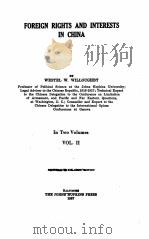
- FOREIGN RIGHTS AND INTERESTS IN CHINA VOLUME II
- 1927 THE JOHNS HOPKINS PRESS
-

- CRIME AND THE LAW
- 1980
-

- GOOD FAITH IN INTERNATIONAL LAW
- 1991 DARTMOUTH
-

- RECOGNITION IN INTERNATIONAL LAW
- 1947 CAMBRIDGE AT THE UNIVERSITY PRESS
-

- BASIC DOCUMENTS IN INTERNATIONAL LAW
- 1972 OXFORD
-
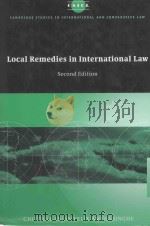
- LOCAL REMEDIES IN INTERNATIONAL LAW
- 1990 CAMBRIDGE UNIVERSITY PRESS
-

- Studies In International Space Law
- 1997 Clarendon Press
-
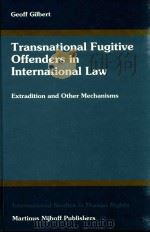
- Transnational Fugitive Offenders in International Law:Extradition and Other Mechanisms
- 1998 Martinus Nijhoff Publishers
-

- Transnational Crime
- 1999 Ashgate Dartmouth
-

- Justice in International Law
- 1994 Grotius Publications
-
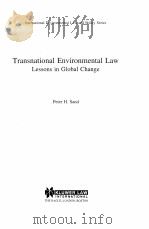
- TRANSNATIONAL ENVIRONMENTEL LAW LESSONS IN GLOBBBAL CHANGE
- 1999 L\KLUWER LAW INTERNATIONAL
-
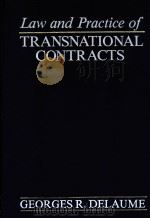
- Law and Practice of Transnational Contracts
- 1988 Kazi Publications
-

- STUDIES IN INTERNATIONAL LAW
- 1973 CLARENDON PRESS
提示:百度云已更名为百度网盘(百度盘),天翼云盘、微盘下载地址……暂未提供。➥ PDF文字可复制化或转WORD
